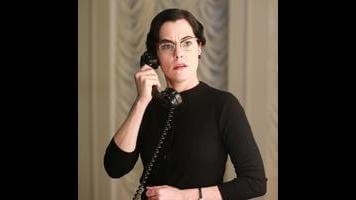The movie focuses on Grace Kelly’s life in the early ’60s, a few years after she left Hollywood at the peak of her fame, marrying Prince Rainier Of Monaco in a fairy-tale wedding that had the whole world buzzing. As the movie opens, her frequent director Alfred Hitchcock (Roger Ashton-Griffiths) comes all the way to Monaco to ask her to star in Marnie opposite Sean Connery. A somewhat-bored Kelly considers the proposition, but then a Monacon crisis sets in: That evil France, led by Charles De Gaulle (André Penvern), is tired of Monaco’s reputation as a tax haven. (No wonder the movie shows Aristotle Onassis spending so much time there.) So De Gaulle attempts to make Monaco a French province, one where the residents would have to pay income taxes. As far as international intrigue goes, it’s not very compelling, even with Parker Posey as an ersatz Mrs. Danvers and betrayal from within Rainier’s inner circle. Turns out it’s about the worst time for the princess of a European city-state to take off to Hollywood and be a movie star again. What’s a royal to do?
Shot on location in Monaco, the film’s vivid visuals spotlight luxurious palatial interiors and magnificent scenery, although the winding hilltop roadways alarmingly foreshadow Kelly’s 1982 death in a car crash. But part of the film’s problem is that its main character is painted with enough angelic qualities to hang out with Mother Teresa. Nicole Kidman is lovely, certainly, and she pretty much captures Kelly’s halting, lyrical voice. Her Grace has no faults to speak of (unless it’s an inexpressive forehead): Devoted to her family and children, working for the Red Cross, speaking her mind like the sassy American she is—then getting scolded for it.
Tim Roth smokes gloomily as Rainier, while Milo Ventimiglia hangs around as Kelly’s journalist pal Rupert Allan, a relationship that’s never fully explained. Among the supporting players, the absolute worst is Frank Langella as Father Francis Tucker, a real-life historical figure who helped matchmake Rainier and Kelly in the ’50s. Now the priest offers “spiritual guidance” alongside meaningless platitudes that bring to mind the Sphinx from Mystery Men: “All fairy tales end sometime,” and, “Only when you truly accept your new role will you find happiness.” As Kelly wavers between Hollywood and Monaco, Tucker orchestrates a crazy royal makeover for this Philadelphia girl, learning French and practicing how to convey emotions like “anger” and “serenity.” As an Oscar-winning actress, doesn’t she already know how to do that?
Perhaps it’s this other-worldliness of Grace Kelly and Kidman’s portrayal that makes this story so hard to relate to: The struggle between palace and mansion isn’t much of a struggle. Kelly’s despair is also inconsistent: At one point she rants to Tucker that she’ll never be able to live out her life married to Rainier; later, she kisses her husband passionately and declares undying devotion. And although Kidman’s gowns and hairstyles are to die for, she honestly looked like she was having a lot more fun in Paddington.
In the end, Kelly rallies her country by rounding up the ladies, sending out letters, and throwing a glamorous ball, as she realizes that her life as a movie star has prepared her for acting the part of a princess and greeting admiring subjects. This all is supposed to climax in a big speech from Kelly, in which she tosses off inspirational statements like “I’m just here” but wins a standing O anyway. We know how the story turns out—Tippi Hedren wound up doing Marnie, one of Hitchcock’s weaker efforts—but we honestly don’t know much about Grace Kelly even after this 100-plus-minute biopic. Viewing any of Kelly’s actual films—Rear Window, The Country Girl, or her final effort (featured in this movie), High Society—would reveal more.


 Keep scrolling for more great stories from The A.V. Club.
Keep scrolling for more great stories from The A.V. Club.